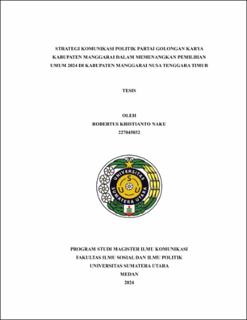Strategi Komunikasi Politik Partai Golongan Karya Kabupaten Manggarai dalam Memenangkan Pemilihan Umum 2024 di Kabupaten Manggarai Nusa Tenggara Timur
Political Communication Strategy of The Golongan Karya Party in Manggarai Regency for Winning The 2024 Elections in Manggarai Regency, East Nusa Tenggara

Date
2024Author
Naku, Robertus Kristianto
Advisor(s)
Zulkarnain, Iskandar
Ridho, Hatta
Metadata
Show full item recordAbstract
This research aims to analyze the Political Communication Stmtegy of the
Golongan Karya Party (Golkar) as well as the Supporting and Inhibiting Factors
of the Political Communication Strategy of the Golkar Party in Manggarai
Regency, East Nusa Tenggara, especially in winning the 2024 General Election
(Pemilu). The five elements of communication proposed by Harold Laswell are
communicator, message, channel, communicant and effect. This research uses a
qualitative method. Meanwhile, the paradigm used in this research is a postpositivistic
paradigm with a phenomenological approach. The sources for this
research are Golkar Manggarai Party cadres who clearly understand Golkar,
have positions in the management of the Golkar Manggarai Party, have
participated in election contests, and community figures who understand political
parties. Data collection techniques use in-depth interviews, focus group
discussions, observation and documentation. The research results show that the
political communication strategy in the Golkar Party in Manggarai Regency
includes: party cadre selection (200 percent selection to get professional
communicators); packaging political messages in the form of vision and mission,
actions, and political contracts; utilization of political communication channels
(use of campaign props, party consolidation, "Teing Hang" rites, sports
competitions, "Penti" events, MSMEs, religious institutions, informal meetings
and social media); determine voter segments, namely beginner voters, young
voters, and women; and evaluating communication activities to see the effects
(cognitive, affective and conative) that occur after implementing political
communication strategies. Supporting factors for political communication are
also found in this research, including the popularity of political party cadres,
political literacy, culture, media and the neutrality of religious institutions.
Meanwhile, inhibiting factors for political communication include cadre
professionalism, money politics, social media, and stigma or labeling.
Collections
- Master Theses [362]
